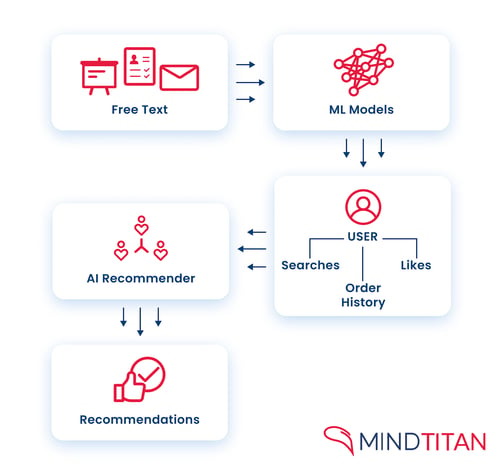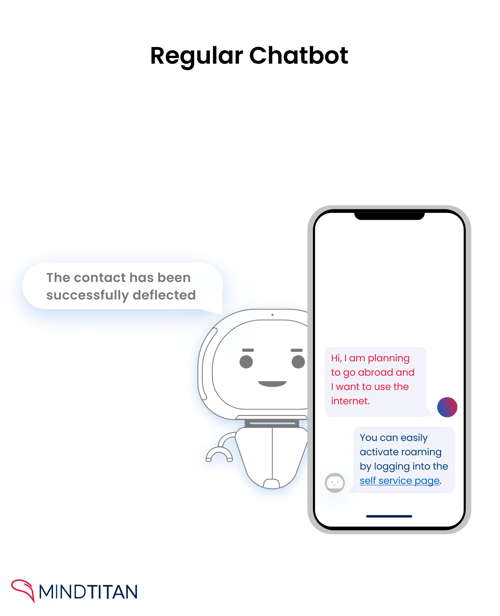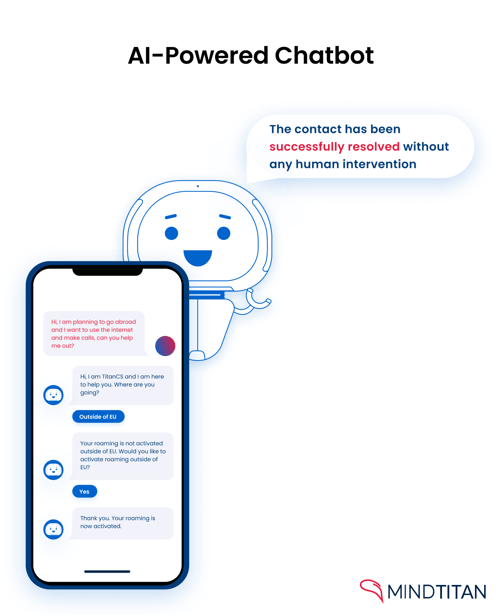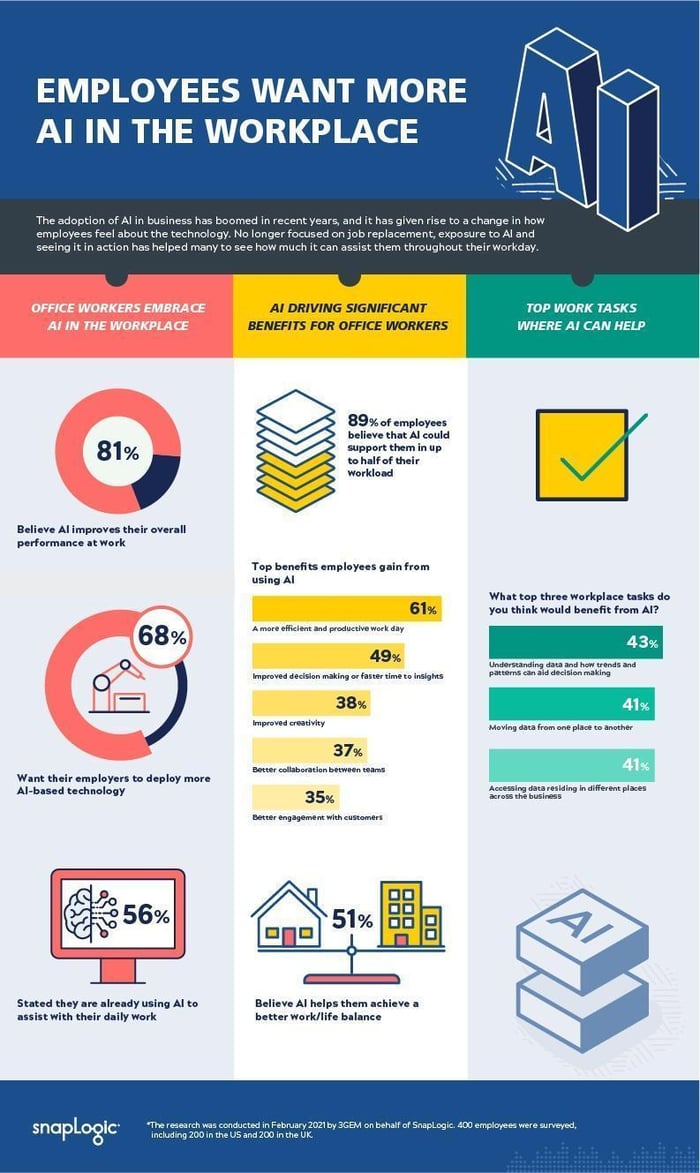April 18, 2022
 by Syeda Umama Rahman / April 18, 2022
by Syeda Umama Rahman / April 18, 2022

Although technologies like artificial intelligence (AI) have been around for years, many businesses today still hesitate to adopt AI-based practices.
As a startup owner, adopting AI tips the scales in your favor. By understanding the exceptional capabilities of AI-powered tools, you can gain an advantage over the competition and introduce your startup to new avenues of innovation and efficiency.
Artificial intelligence is the science of making machines smart. Using various computing concepts such as machine learning and voice recognition, scientists have made machines capable of imitating humans and performing human-like actions. From spam filters and image identification to medical diagnoses and self-driving cars, there are infinite successful applications of AI in the real world.
With the power of AI, you can efficiently yet creatively solve business problems and take your nascent startup to new heights of success and growth.
Statista reports that the global AI software market value will reach a whopping $126 billion by 2025. The technology itself is here to stay and ranks higher in popularity every day.
With an increasing number of AI applications being released, the demand for AI solutions has also skyrocketed. It’s safe to say that corporations will continue to heavily invest in intelligent solutions to aid with business operations.
The different uses of AI for startups allow you to invest in some amazing, incredibly practical products and services powered by the latest algorithms.
AI can help startups achieve incredible levels of growth and:
Not long ago, artificial intelligence was considered a niche that only large corporations could afford. Companies like Meta (previously Facebook), Google, Microsoft, and Amazon were – and still are – busy conducting expensive private research into AI and tapping into its expansive potential. At the time, small and medium-sized businesses couldn’t even imagine gaining access to that kind of technology.
Cut to the present. While AI remains a largely untapped market, it has become much more accessible to startups and small- to medium-sized businesses. Today, plenty of boxed AI software products and services are easily available to entrepreneurs who can’t afford to invest millions into AI.
The rise of low- and no-code platforms is another contributing factor. As these low-cost applications have fallen within reach of smaller businesses, some high-level business execs have even become concerned about the growing accessibility of AI.
With the right initiative and motivation, startups can use AI systems to the best of their capabilities, enabling them to take on corporate giants on an even digital playing field.
A large part of competitor analysis revolves around collecting and manipulating large volumes of data. Coincidentally, artificial intelligence is also highly data-intensive, making it an ideal tool that you can use to your advantage.
You need to keep an eye on hundreds of things as a budding entrepreneur, from regularly monitoring the online activity of competing brands to getting your hands on their publicly available financial reports. However, analyzing each piece of information can take large amounts of time and labor.
Smart AI automation and analysis tools offer efficient, cost-effective systems that quickly collect and analyze data in record time to provide actionable insights to benefit your startup. For example, you can automate repetitive routine tasks such as audit reporting or image recognition with human-in-the-loop machine learning models. You can make quick decisions based on these observations to stay relevant in a tough market.
Does your startup struggle to successfully establish and maintain an online presence? Is it too costly to hire a seasoned digital marketer or business development executive? If you don’t have anyone to handle sales activities, how will you ever get around to selling your product or service? Without a strong marketing team, won’t you keep losing your target market to the bigger contenders in the industry?
AI will help you answer all of these questions.
Perhaps one of the most wondrous uses of AI for startups is the plethora of software available for small businesses that automate and improve their marketing and sales functions. In addition to predictive analytics, these software use NLP applications – including concepts such as text classification, sentiment analysis, and recommendation algorithms – to decode how your startup can best communicate and connect with your customer base.
Content creation and publishing are essential marketing activities for startups. Interesting blog posts, infographics, and videos are great ways to spread the word about a new business. However, there are a lot of complex, lengthy processes involved before you can publish high-ranking, attention-grabbing content to appeal to your target audience. Even the writing process itself can be quite time-consuming.
Tools like Semrush and Surfer are examples of a great content optimization platform, making the process of content creation quick and simple. They use AI tools to assist writers in optimizing their content for the tone of voice, readability, keyword research, and plagiarism. These software compare your writing to the materials your competitors put out there, suggesting intelligent improvements to top your competitors’ content marketing efforts. The best AI writing tools go so far as to write fresh pieces of content for you from scratch, although the quality of such pieces can be questionable.
Other software solutions include customer relationship management (CRM), email marketing, social media management, advertisement campaigns, and content personalization. Some tools offer special prices for startups and beginners, making them great options for entrepreneurs looking for affordable yet efficient apps to manage their startup operations.
Intelligent recommendation engines are also a great way to effectively market your offerings and generate leads. Recommendation systems use AI and machine learning to carefully study your target market’s behaviors and then suggest results with a higher probability of lead generation and conversion.

It’s a well-known fact among marketers that returning customers are as important as (if not more than) new customers. Customer retention is an underrated and often ignored aspect of business growth.
As a startup owner, you must prioritize ensuring existing customers are satisfied and stay loyal, so they keep coming back for more. Customer retention can be much cheaper than acquiring new customers.
Customer support services automation has undergone a major revamp in recent years. Since the inception of machine learning, scientists have been striving to make computers capable of carrying out human-like conversations. Over time, this technology has evolved into what we know today as conversational AI, a powerful contributor to the evolution of the customer service industry.
Let’s talk about the different support-related uses of AI for startups to easily invest in and how they can help keep both new and old customers happy.
Chatterbots, more commonly known as chatbots, are digital assistants that you can integrate with your user-facing online platform. They act as virtual support agents that can guide website visitors through queries of varying difficulty levels.
The earliest chatbots were pre-programmed with a fixed dataset of questions and corresponding answers. Users could only choose from a given list of options, and the chatbot would answer with pre-written texts. These simple rule-based bots are still used by many companies today for situations where customers may not have complex queries, such as booking a table at a restaurant.

For more sensitive scenarios, businesses now use artificially intelligent chatbots capable of recognizing and understanding text-based human languages. These chatbots are advanced enough to meaningfully resolve customer issues without any human assistance.

Chatbots make your business infinitely more available at a much lower cost than employing multiple contact center agents in rotational shifts. Your business can save tons on onboarding, training, and retention costs with chatbots. Plus, these digital assistants don’t require holidays or breaks, unlike their human counterparts.
Chatbots will also make your business more approachable since many customers find it more convenient to get answers immediately, rather than getting ahold of a human agent on a call.
While speech recognition technology has been around for decades, it has only recently brought about key advancements in the customer service department. Evolving from chatbots, customer support has moved one step ahead, allowing digital agents to venture even closer to human-like behavior.
Mobile assistants, such as Siri and Cortana, are used by leading brands to offer a unique customer experience. These voice assistants are capable of understanding and responding to the spoken word. Some assistants are constantly on standby and can be activated automatically by speaking a certain phrase, like “OK Google” or “Hey Siri”. You can also pick your own custom wake words.
Voice assistants use more sophisticated mechanisms, such as advanced speech recognition, text-to-speech (TTS), and natural language understanding (NLU). These not only help the machine comprehend what the customer says but also allow the virtual agent to speak its responses out loud as a human would.
Intelligent voice-response systems are the latest large-scale development in the automated customer service landscape. Interactive agents are based on similar technologies used for dedicated voice assistants. Startups that are not capable of developing dedicated mobile agents from scratch can easily and cost-effectively go for interactive agents for their contact centers.
Conversational interactive voice response (IVR) relies heavily on advanced machine learning algorithms, which empower virtual contact center agents to carry out proper voice-intensive conversations with callers in real-time. IVR systems are often deployed in the cloud and utilized in automated, AI-driven contact centers to maximize their scalability and facilitate their implementation.
Voice response systems have made online support agents more intelligent than ever. As the capability of AI-powered systems grows, so does their ability to better understand human behavior. These systems observe customers more closely, detect customer intent, uncover discrete underlying patterns, ask better follow-up questions, and accordingly cater to people seeking pre- and post-sales support.
Smart systems can determine when it would be best to let a human agent take over. They also figure out customer behavior patterns to provide maximal personalization, actively boosting sales and revenue for startups. Along with driving down contact center costs, automated smart agents reduce call wait times and lead to improved customer experience and happier callers.
According to Accenture and Frontier Economics, there will be a 40% increase in workforce productivity in developed countries by 2035. Let’s look at why that seems quite likely.
Running a startup requires a lot of manual, mental, and emotional labor from every team member. This, coupled with the lightning-fast pace that most startups move, can quickly cause employee burnout. Consequently, the company is prevented from rapid growth and suffers in the short and long run.
For example, let’s say you have to determine how to price your products for an upcoming sale. Your team needs to gather data for the campaign and exhaust hours of manual effort analyzing it to make this critical business decision. Would this effort be worthwhile if you could not make a timely decision? On top of that, the task might quickly become boring for your team members, who might lose interest in their jobs. It would also be a waste of their actual skills.
Leveraging AI to automate and streamline certain business operations such as data collection, research, financial reporting, marketing, and customer service can help automate monotonous and repetitive processes. Your employees can then focus better on their core skills and become more efficient and productive at work.
AI is not just something employers want in the workplace. Employees want more of it, too, according to a small-scale survey conducted for SnapLogic by the market research agency 3Gem. The survey concluded that a majority of participants believe that AI has transformed their lives for the better and want their employers to invest in more AI. The results cemented that AI is a game-changer for business owners and workers alike.
 Source: SnapLogic
Source: SnapLogic
No business can succeed without a prolific workforce, no matter its size or area of operation. Employees make the business, which holds especially true for newly established businesses just starting out in the industry.
If you wish to make a lasting first impression in the market, your startup needs a talent pool that excels in everything they do, as there is often little room for error.
The developments that have taken place in the recruitment sphere, thanks to artificial intelligence, are truly phenomenal. Both recruiters and applicants are now open to a world of previously undiscovered opportunities.
The AI-driven recruitment process takes much less time than the traditional cycle. In the past, recruiters would have to spend hours manually scouring through tens of hundreds of resumes to shortlist top applicants. Candidates, too, would be forced to go through lengthy descriptions for every job they applied for, with no idea if a particular job is a good match for them.
But now, AI-powered job portals collect and collate the data obtained from employers and applicants. After careful algorithmic analysis, the system automatically determines which candidate would be best suited for a particular role.
Some of these platforms can also provide valuable suggestions to candidates on how they can further improve their profiles. One such artificially intelligent assistant is Phil by ZipRecruiter. Phil not only helps match candidates to their ideal jobs but also “pitches” top candidates’ profiles to employers. With more and more user feedback, Phil keeps evolving to accurately match job-seekers to their dream careers and roles.
Certain tools, such as the one offered by Pymetrics, aid recruiters with the testing process. These tests are based on psychometric data obtained from some top industry professionals. Applicants play through games that help the system shortlist top candidates by matching their intrinsic traits with existing experts in the workforce. Thus, the testing process has become smarter and more accurate, helping businesses hire the best-match employees.
Other human resources management (HRM) tools can help startups ethically monitor their employees’ performances, engagement levels, and interactions and suggest the best ways to retain and manage the workforce.
And the best part is that all this can easily be achieved – even if you don’t have a proper HR department!
The science of startup growth is a difficult one to master. But the numerous innovative uses of AI for startups have immense potential to help new businesses like yours stand a fighting chance in increasingly competitive markets.
You can hire the best possible resources for your new team via AI platforms. With intelligent solutions that can augment almost all critical business functions, you and your team members can focus on your core competencies and let digital systems handle the rest.
When you leverage AI-based systems, you can derive valuable business insights from large amounts of gathered data with higher accuracy, lower overheads, and greater efficiency. Even your customer service department can greatly benefit from AI software, strengthening your brand image and customer satisfaction rates.
When used right, these systems can empower you to achieve a competitive edge over both small businesses and large corporations.
To utilize the power of AI in the best way, it is vital that you understand the costs and nuances associated with the use of AI systems. If you’ve been successfully convinced to give AI a try, make sure that you conduct a proper impact analysis before making any major changes in the workplace.
Start slow and small, measuring costs against benefits to make the best use of your initial investment. With the right digital strategy and unified customer experience, your startup will accelerate towards growth and success.
Looking for more ways to do more with less? Check out growth hacking marketing, an experiment-driven approach to rapid growth that pairs perfectly with hyperlocal marketing.
Syeda Umama Rahman is a professional content writer and editor with a computer science background and excellent research experience. Umama writes about software and IT industries and works proactively to venture further into these fields.
No two startups are the same, but there’s one thing they all have in common.
 by Lina Lugova
by Lina Lugova
"'Sorry for the delay, we're experiencing higher than usual volume..." If your customer support
 by Vishnu Prasad Selvaraj
by Vishnu Prasad Selvaraj
There is a disconnect in customer service.
 by Nanditha Vijayaraghavan
by Nanditha Vijayaraghavan
No two startups are the same, but there’s one thing they all have in common.
 by Lina Lugova
by Lina Lugova
"'Sorry for the delay, we're experiencing higher than usual volume..." If your customer support
 by Vishnu Prasad Selvaraj
by Vishnu Prasad Selvaraj


